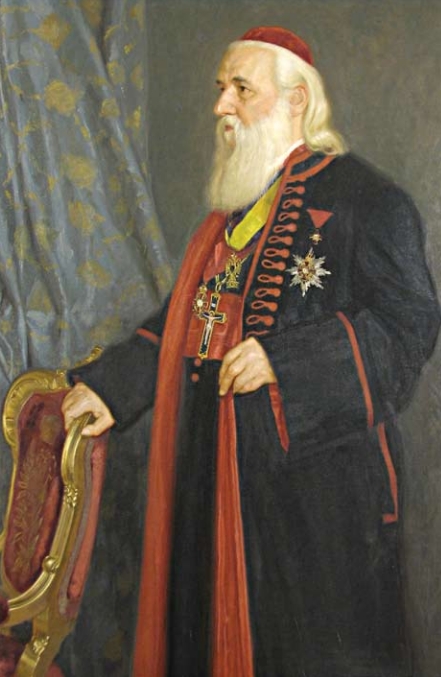Ioan Mețianu on:
[Wikipedia]
[Google]
[Amazon]

 Ioan Mețianu (; May 9, 1828–February 3, 1916) was an Austro-Hungarian cleric of the
Ioan Mețianu (; May 9, 1828–February 3, 1916) was an Austro-Hungarian cleric of the
, entry in

 Ioan Mețianu (; May 9, 1828–February 3, 1916) was an Austro-Hungarian cleric of the
Ioan Mețianu (; May 9, 1828–February 3, 1916) was an Austro-Hungarian cleric of the Romanian Orthodox Church
The Romanian Orthodox Church (ROC; ro, Biserica Ortodoxă Română, ), or Patriarchate of Romania, is an autocephalous Eastern Orthodox church in full communion with other Eastern Orthodox Christian churches, and one of the nine patriarchates ...
.
Born in Zărnești
Zărnești (; german: link=no, Molkendorf, Zernescht; hu, Zernest) is a town in Brașov County, Transylvania, Romania, with a population of 21,681. It administers one village, Tohanu Nou (''Neu-Tohan''; ''Újtohán'').
It is located near the ...
, in the Transylvania
Transylvania ( ro, Ardeal or ; hu, Erdély; german: Siebenbürgen) is a historical and cultural region in Central Europe, encompassing central Romania. To the east and south its natural border is the Carpathian Mountains, and to the west the Ap ...
region, he attended high school in Brașov
Brașov (, , ; german: Kronstadt; hu, Brassó; la, Corona; Transylvanian Saxon: ''Kruhnen'') is a city in Transylvania, Romania and the administrative centre of Brașov County.
According to the latest Romanian census (2011), Brașov has a pop ...
and Cluj
; hu, kincses város)
, official_name=Cluj-Napoca
, native_name=
, image_skyline=
, subdivision_type1 = County
, subdivision_name1 = Cluj County
, subdivision_type2 = Status
, subdivision_name2 = County seat
, settlement_type = City
, le ...
, studying theology in Sibiu
Sibiu ( , , german: link=no, Hermannstadt , la, Cibinium, Transylvanian Saxon: ''Härmeschtat'', hu, Nagyszeben ) is a city in Romania, in the historical region of Transylvania. Located some north-west of Bucharest, the city straddles the Ci ...
. He served as a priest in Râșnov
Râșnov (; german: Rosenau; hu, Barcarozsnyó; Transylvanian Saxon dialect: ''Ruusenåå''; Latin: ''Rosnovia'') is a town in Brașov County, Transylvania, Romania with a population of 15,022.
It is located at about from the city of Brașov ...
(1853-1857) and in Zărnești (1857-1874), rising to archpriest in 1859. He belonged to various diocesan institutions in Sibiu, was a member of the national church council and an ally of Metropolitan Andrei Șaguna
Andrei Șaguna (; 20 January 1808, Miskolc, Hungary – 28 June 1873, Nagyszeben, Hungary) was a Metropolitan bishop of the Romanian Orthodox Church in Transylvania, and one of the Romanian community political leaders in the Habsburg monarchy, ...
. After remaining a widower, he was elected vicar bishop for Oradea, a post he held from 1874 to 1875. Then, from 1875 to 1898, he was Bishop of Arad. In December 1898, he was elected Archbishop of Sibiu and Metropolitan of Transylvania
Metropolitan may refer to:
* Metropolitan area, a region consisting of a densely populated urban core and its less-populated surrounding territories
* Metropolitan borough, a form of local government district in England
* Metropolitan county, a ...
. Enthroned the following March, Mețianu remained in office until his death.
While still an archpriest, Mețianu organized Romanian confessional primary schools, guided the building of churches and, in 1865, was elected to the Transylvanian Diet
The Transylvanian Diet (german: Siebenbürgischer Landtag; hu, erdélyi országgyűlés; ro, Dieta Transilvaniei) was an important legislative, administrative and judicial body of the Principality (from 1765 Grand Principality) of Transylvania ...
. While bishop of Arad, he supervised numerous primary schools, founded a girls' middle school in Arad and a boys' boarding school in Beiuș
Beiuș (; hu, Belényes) is a city in Bihor County, Romania near the Apuseni Mountains. The river Crișul Negru flows through Beiuș, and the city administers a single village, Delani (''Gyalány'').
Between the late 18th and very early 20th ...
, started a diocesan printing press, launched the newsletter ''Biserica și școala'' in 1877, constructed a new building for the theological-pedagogical institute and founded an endowment for poor priests and widowed priests' wives.
As metropolitan, he initiated and led building work for the new cathedral, as well as for the theological-pedagogical institute's new building. He guided the activity of this institute, of '' Telegraful Român'' newspaper and of the nearly 800 confessional primary schools in the archdiocese; and started endowments for Romanian pupils and students, or for other cultural and philanthropic purposes. In the Diet of Hungary
The Diet of Hungary or originally: Parlamentum Publicum / Parlamentum Generale ( hu, Országgyűlés) became the supreme legislative institution in the medieval kingdom of Hungary from the 1290s, and in its successor states, Royal Hungary and ...
, he belonged to both the House of Representatives and the House of Magnates
The House of Magnates ( hu, Főrendiház) was the upper chamber of the Diet of Hungary. This chamber was operational from 1867 to 1918 and subsequently from 1927 to 1945.
The house was, like the current British House of Lords, composed of hered ...
, where he defended maternal-language rights in Romanian primary schools.
His articles, speeches and sermons appeared in ''Biserica și școala'' and ''Telegraful Român''."Ioan Mețianu", entry in
Mircea Păcurariu
Mircea Păcurariu (30 July 1932 – 13 January 2021) was a Romanian theologian, historian and priest in the Romanian Orthodox Church.
Biography
Born in Ruși, Hunedoara County, he was the son of the village priest. He enrolled in the History ...
, ''Dicționarul Teologilor Români'', Editura Univers Enciclopedic, Bucharest, 1996
Notes
{{DEFAULTSORT:Metianu, Ioan 1828 births 1916 deaths People from Zărnești Romanian Austro-Hungarians Romanian Orthodox metropolitan bishops Members of the House of Magnates Members of the House of Representatives (Hungary)